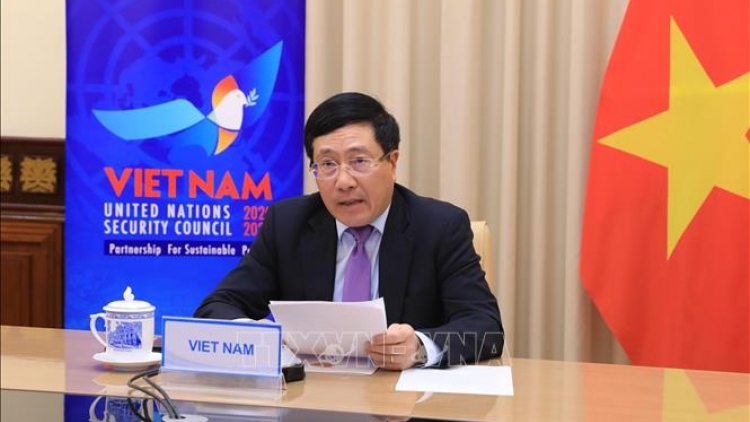Deputy PM attends UNSC’s debate on UN-African Union co-operation
VOV.VN - Deputy Prime Minister and Foreign Minister Pham Binh Minh addressed a debate of the United Nations Security Council (UNSC) under the chair of President of South Africa Cyril Ramaphosa on December 4 to discuss co-operation activities between the UN and the African Union (AU).

During his speech, Deputy PM Minh praised Africa’s efforts and the successful role of the AU and various sub-regional organisations in promoting regional integration coupled with socio-economic development in recent times.
Furthermore, challenges such as terrorism, transnational crime, climate change, food and water security, the spread of the novel coronavirus (COVID-19) pandemic, and ebola, have served to deal a heavy blow to peace and stability in many countries throughout the continent, creating greater risks of worsening current conflicts and increasing instability, he added.
The Vietnamese diplomat affirmed that the co-operation ties between the UN and AU serve as an important framework for the implementation of security and peace initiatives throughout the region. This largely comes from the utilisation of international support and expertise, as well as the role of regional mechanisms such as the AU, which helps to prevent and address conflicts in Africa.
On this basis, the Deputy PM Minh put forth some suggestions in an attempt at bolstering mutual ties between the UN and AU which aims to enhance the co-ordinating role of the AU in handling regional conflicts, whilst simultaneously elevating the mutual strategic partnership.
He also put forward the idea of expanding inter-regional co-operation and underlined the sound traditional friendship that exists between Vietnam and African nations.
Stable co-operation ties between the UN and regional organisations has always been among the country’s top priorities during its current term as a non-permanent member of the UNSC. Indeed, this was realised through an initiative aimed at holding the first ever meeting on ASEAN-UN co-operation while the nation served as the President of the UNSC in January.
The country therefore always stands ready to be active in making contributions to the co-operation process in an endeavour to strengthen the ASEAN-AU partnership for the common benefits of Asia and Africa moving forward.
During the course of the debate, delegates hailed the UN-AU strategic partnership and contributions made by the AU to advocate peace, security, and development in Africa. As such, both the UN and the AU must strive to further deepen co-operation in response to global challenges, whilst also preventing and handling regional conflicts, they stressed.
Participants also affirmed that the co-operation framework between the UN and regional organisations must be maintained and consolidated to stay in line with the Chapter VIII of the UN Charter.
They noted the great significance of achievements gained through UN-AU co-operation activities over the years, many of which have contributed to the political-peace and socio-economic process in countries such as the Central African Republic, South Sudan, and Sudan.
Those in attendance also expressed their concerns at complicated developments occurring in nations such as Libya, Yemen, and Somalia, along with the Sahel and Lake Chad region. They voiced their hopes that the AU and the UN will continue their close co-operation as a means of handling global challenges and addressing the root causes of conflicts.
Originally launched in 2002, the AU is a continental body that consists of 55 member states that make up the countries of Africa, featuring a combined population of 1.3 billion and accounting for 3% of global GDP.
The union acts as an observer at the UN General Assembly. In December, 2018, the UNSC held its first debate on the UN-AU co-operation, with a focus on increasing finance for peacekeeping operations on the continent.
